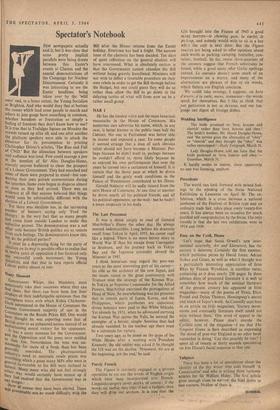Spectator's Notebook
FEW newspapers actually said it, but it was clear that
some pretty implicit parallels were being drawn between this Easter's events at Clacton and the annual demonstrations of the Campaign for Nuclear Disarmament. Certainly it was interesting to see the Easter headlines being at Brighton. And who would deny that at bottom the causes which lead some people to march and others to join gangs have something in common, whether boredom or frustration or simply a feeling of freedom they don't know how to use? It is true that in Trafalgar Square on Monday the crowds turned up after all, and one after another
the platform speakers were able to attack the Observer for its presumption in printing
Christopher Driver's articles, The Rise and Fall of CND.' But the alienation between speakers and audience was total. Few could manage a jeer at the mention of Sir Alec Douglas-Home, scarcely anyone bothered to cheer the prospect of a Labour Government. They had marched and some of them were prepared to stand—but con- ducting their .own private conversations during the speeches. Some even began to disperse almost
as soon as they had arrived. There was no evidence at all that anyone believed that things Would soon be substantially different with the election of a Labour Government.
Yet there was idealism too, in the increasing number of banners saying only Teed the
Hungry,' in the very fact that so many people had come from outside London to make this collective protest. The demonstration was a sad „affair only because British politics are so remote 'tom such feelings. The demonstrators know this, but do the political parties? It must be a depressing thing for the party of Idealism on its way to possible office to realise that In twelve years of opposition it has fostered only onesuccessful youth movement, the Young Socialists, and that that in turn rejects official
Lab '


































 Previous page
Previous page